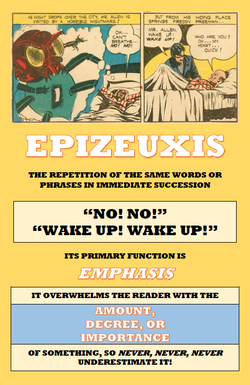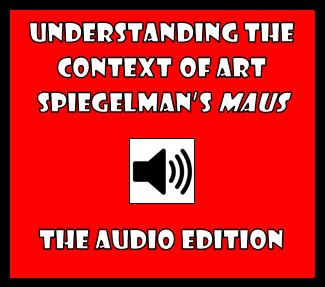|
I thoroughly enjoyed my time this past weekend at CITE 2016, the annual meeting of the Conference of Independent Teachers of English. For those of you who attended my sessions, and for those of you who didn't but are interested in the material, here are the Prezis for your viewing pleasure!
Seeing through the Gaze: Using Critical Theory to Teach Advertising, Visual Narrative, Literature and FilmBest Class Ever! -- The Technology Edition
0 Comments
Glen Downey, Comics in Education, www.comicsineducation.com
A new issue of Martian Comics -- "The Canals of Earth" -- is coming your way in an exciting courtesy of new Kickstarter! Before you do anything, check out the video above and then lend your support to Julian Darius and Kevin Thurman's exciting new addition to the series.
Julian was kind enough to answer my questions about the series. It's this kind of thoughtfulness, insight, and love of comics that makes Martian Comics Why Martian Comics? What was your original motivation for the series?
Kevin Thurman, my co-writer, had an idea for a story, and we'd talked about it in several iterations. He revised it again, tying it to the sci-fi backstory I'd created for the publisher Martian Lit! So from there, I was locked into the concept, and I felt invested in it. And it just snowballed from there.
But I love the title "Martian Comics!" It's such a throwback to things like Adventure Comics or Action Comics. And I meant that title as a kind of umbrella designation, indicating that we're building a universe here that's bigger than any single story. What does "The Canals of Earth" bring to the series?
"The Canals of Earth" is the story of the early days of Mars-Earth relations. Most of it is a flashback, as we watch ancient Martians looking towards Earth and imagining a Martian goddess named Earth, the same way humans once imagined a god named Mars. We also see Martian science-fiction, in which Earth is imagined as a very Martian-like society, but more advanced and eager to invade Mars. This science fiction evolves. And we track the whole relationship through the Martian space age.
In terms of the larger series, this story occurs thousands of years prior to almost anything we've seen so far. Martian Comics is simultaneously running "The Girl from Mars" and these other stories. Those stories are part of a large short story collection. "The Canals of Earth" would be a very early story in that collection, in which we see Mars-Earth relations grow and change over millennia (and see lots of other stuff evolve too!). "The Canals of Earth" does give us our earliest depiction of Martian society, a glimpse of early Martian religion, and reference to a Martian city we've never seen before. We're building something big. But you can enjoy "The Canals of Earth" without any previous knowledge! It's just a good sci-fi story. What does the sophisticated reader take away from Martian Comics? What are you hoping they take away?
First, I just hope that people like the issue and enjoy the story. I think the art's beautiful, and the writing is beautiful, and if someone enjoys it, that's enough for me!
Second, I hope that people take away a kind of mind-bending way of imagining a very foreign perspective. We're not on Earth in this story. We're looking at how Mars has seen and imagined Earth. We're decentralized. And we're seeing Martians imagine that people on Earth would look like them. We're seeing how Martian science-fiction is a projection of Martian anxieties, and it's laughable but wonderful, in that old-school sci-fi way. Readers might be tempted to study the history of science-fiction after this issue! But I like this idea of a totally decentralized story, in which we're seeing a parallel of our own history but through alien eyes, and the entire story is this sort of distorted mirror that puts our own anthropocentric tendencies in stark relief. And maybe, just maybe, through that, some readers might see a parable of our own anthropocentrism and the need to imagine other perspectives! Maybe. In any case, there are things to think about here, places for the readers' brains to go! And I like giving readers these experiences, and seeing what they think about, which is never exactly what I'd think about -- and that's great! Third, on a more meta level, I hope the sophisticated reader sees a comic that demonstrates that comics can do this -- make people think. So many of the comics that have most affected me were intelligent. Certainly, the truly classics are. And I think you can be intelligent and entertaining at the same time. But I think that there's a perception that most of the smart comics being made are autobiographical or "non-genre," whereas the genre work tends to be flashy but a little thoughtless. Martian Comics is here to say, "No, you can do smart -- even really smart -- sci-fi comics that are still sci-fi, and unembarrassed about their genre, and fun!" "The Canals of Earth," in particular, really reminds me of some issues of Planetary, which was intelligent and played with genre and had the same sort of mix of smart fun. Comics can do this. We know that. And we need to get back to it. Where do you see the series going from here?
Everywhere. I'm in it for the long haul. We'll be continuing with "The Girl from Mars" and these other Martian stories for a while yet. We'll be getting out collected editions. Eventually, these other stories, like "The Canals of Earth," are going to be a massive volume spanning thousands of years, with different cultures and characters and historical trends being explored in a really sprawling way. I've got other ideas, other volumes, stories I want to tell. There's a very long-term plan here. We may only be on issue #5, but I'm currently writing a story that'll probably be in issue #13, and I've got plans for many dozens of issues' worth of material after that.
What do you think is the most compelling reason for readers of Comics in Education, or fans of comics in general, to support your Kickstarter campaign?
Because comics can do this. They can tell ambitious stories that can only be told in comics.
|
Glen DowneyDr. Glen Downey is an award-winning children's author, educator, and academic from Oakville, Ontario. He works as a children's writer for Rubicon Publishing, a reviewer for PW Comics World, an editor for the Sequart Organization, and serves as the Chair of English and Drama at The York School in Toronto. If you've found this site useful and would like to donate to Comics in Education, we'd really appreciate the support!
Archives
February 2019
|



 RSS Feed
RSS Feed
